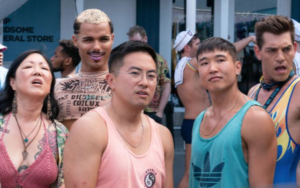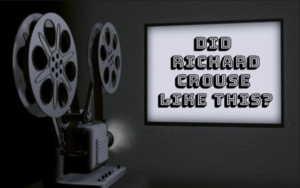 Author Jane Austen passed away, age 41, in 1817 but her influence has proven to be timeless. Her novels, literary studies in parody, burlesque and irony mixed with social commentary, have enjoyed second lives in everything from “Clueless,” an update of “Emma” set in Beverly Hills, and the self-explanatory “Pride and Prejudice and Zombies.”
Author Jane Austen passed away, age 41, in 1817 but her influence has proven to be timeless. Her novels, literary studies in parody, burlesque and irony mixed with social commentary, have enjoyed second lives in everything from “Clueless,” an update of “Emma” set in Beverly Hills, and the self-explanatory “Pride and Prejudice and Zombies.”
Add to the list, just in time for Pride Month, “Fire Island,” a new LGBTQ2+ romantic comedy on Disney+, based on Austen’s “Pride and Prejudice.”
Joel Kim Booster stars as Noah, part of a twentysomething group of friends who gather every year for a week of mixing and mingling at a Fire Island house owned by their friend and den mother Erin (Margaret Cho). It is a tradition and a sacred “gay Disney World” weekend for bookworm Max (Torian Miller), pleasure seekers Luke (Matt Rogers) and Keegan (Tomas Matos) and Noah’s best friend Howie (“Saturday Night Live’s” Bowen Yang) who now lives in San Francisco but makes the trip every year.
Determined to arrange a love match, or at least a hook-up, for the insecure Howie, Noah is on the look-out for eligible men.
Enter the “prejudice” part of the story, the Mr. Darcy character, Will (Conrad Ricamora). He’s a snobby, wealthy man visiting the island with a gaggle of his lawyerin’ and doctorin’ friends. Will’s friend Charlie (James Scully) and Howie hit it off, but will Noah and Will be able to overcome their differences and become friends?
Originally created as a series on the now-defunct Quibi service, “Fire Island” has expanded to feature length with its exploration (by way of Austen) of class and status intact. Booster, who stars and wrote the script, transposes Austen’s corsets and petticoats for Speedos and wild drug and booze fueled parties but maintains the source material’s study of overcoming obstacles for true love, class status and, especially in reference to Noah’s clique, the strength of a family network. The bond between the guys is at is the heart of this R-rated movie and helps anchor the raunchier and lighter “Legally Blonde” moments.
Director Andrew Ahn keeps up the pace, and makes Fire Island look like a million-dollar getaway. That glossy style, combined with Austen’s sensibility, adds up to an entertaining comedy of manners; lightweight, but celebratory.
 Richard appears on “CTV News at 6” with anchor Andria Case to talk about the best movies and television to watch this weekend. This week he has a look at the brontoborus “Jurassic World Dominion,” Adam Sandler in dramatic mode in “Hustle” (Netflix) and, just in time for Pride Month, “Fire Island” (Disney+).
Richard appears on “CTV News at 6” with anchor Andria Case to talk about the best movies and television to watch this weekend. This week he has a look at the brontoborus “Jurassic World Dominion,” Adam Sandler in dramatic mode in “Hustle” (Netflix) and, just in time for Pride Month, “Fire Island” (Disney+).







